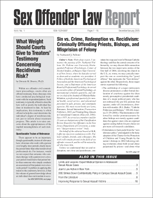Legal Restrictions and Penalties Imposed on Child Pornography Defendants Demand Better Alignment With Risks
Author: Ian N. Friedman, Esq..; Robert Weiss Ph.D., M.S.W..
Source: Volume 20, Number 60, October/November 2019 , pp.82-84(3)

next article > |return to table of contents
Abstract:
Once in the criminal justice system, individuals accused of possessing and viewing child pornography routinely experience certain surprises, shocks, and harsh realities. Some examples include the following: Shock at the immediate punitive treatment of those who are supposedly presumed innocent, especially if the family has never been involved in the criminal justice system; Frustration with the inefficiencies and excessive time expended in processing the case; Surprise that child pornography convictions routinely result in draconian sentences; and overwhelmed from the financial cost of properly defending their case. The current legal paradigm applied to those accused of child pornography offenses is inordinately punitive. (Ian N. Friedman, Esq., & Robert Weiss Ph.D., M.S.W., One-Size-Fits-All Federal Law Treats All Child Pornography Defendants the Same, 20(5) SLR 65 (Aug./Sept. 2019).) Additionally, because media accounts of high-profile cases tend to inflame the reaction of jurors and even judges when faced with a child pornography case, anyone passing judgment on the defendant is likely to lack clear objectivity in their assessment of the facts of the case. Harsh reactions to these cases, in part, can be traced to at least one widely disseminated but discredited piece of social science research that has not been adequately eclipsed by updated research on child pornography. More research is needed to make clear that the old assumptions about the risks associated with individuals convicted of crimes related to child pornography are not accurate. This article continues the discussion about the one-size-fits-all federal legal standards applied to child pornography defendants. One key problem that is difficult to resolve is that, because the crime involves children (even if not actual contact with children), defendants are all subject to restrictions that can jeopardize their home and work lives. The problem is not the standards per se, but the inability to—or lack of interest in—quickly and adequately making distinctions among offenders whose levels of dangerousness vary. The effects on the defendant and family, especially the difficulties getting adequate treatment, are outlined below. Also, the article explores the challenges experienced by convicted offenders while serving their sentence and post-prison. All of this demonstrates the need for validated research on this cohort of sex crime offenders. The authors argue that the punitive treatment of this particular type of sex crime offender needs to be aligned with the actual risks these offenders present.Keywords: Pretrial Restrictions; Trial Preparation; Sentences; 18 U.S.C. § 3553(e)
Affiliations:
1: Friedman & Nemechek, L.L.C.; 2: Seeking Integrity.